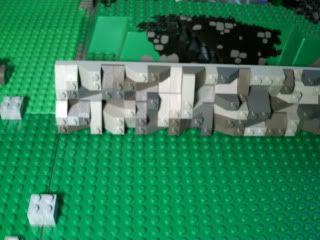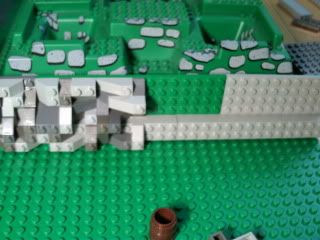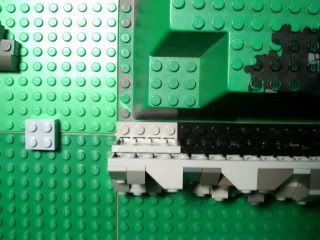Kevin1990 wrote:its really an greate topic, but I think this is reallyfor advanced people I know I could never build mountains and differant hights like that It would take years for me not to menchan ALOT of bricks, and for kids who dont really have a full time job and a very low salarij this is basicly really inpossible, I do admit it looks way cool when you have levels in the sceneri but it would take alot of green bricks and slopes to create it.
I think you'll be surprised if you look through your collection. When I first began some basic lanscaping, I had enough green plates to cover roughly an 8x8 area, just enough for a vig. On further investigation into my collection, I discovered 2 6x3 double 45* wedges, and 50 2x4 bricks (I was given these as a supplementary pack, but had never found use for them), in green. Now I could landscape a 32x16 baseplate.
In regards to grass-scaping, I'm not a big fan of using slopes in conjunction with pure studs-up construction, as the smoothness in contrast to the studs makes it looks funny - not the same type of grass - to me [1]. In this instance a few tiles/slopes elsewhere in the grass-scaping gives a more uniform "rough" effect [2]. However, I think it looks better to build grass only studs-up, which implicates the use of angled plates where steeper gradients occur. This can be as simple as using a 1x2 plate, but not pushing it down fully, although it still holds in place. As I don't use a plate differential of more than one plate high for grass [3], this is useful if the drop needs to be greater than this. As the gradient increases, tilted plates won't hold in place as well, so hinges are necessary, especially
1x2 hinge bricks. This, in conjunction with jumper plates and small plates, to ensure that there are no gaps around the plate, allows for the steeper gradients to be successfully achieved. (
Example, note the use of jumper plates between the two pillars to fill the gap between the plates). Also in the example can be seen a grassy overhang using a tilted wedge plate in the middle foreground - this ensures that there is no sharp edge between cliff and grass. On the left you can see the use of 1x1 plates slightly below the edge of the cliff (better shown in Aaron's
Dwarfs' Gate), to give a less barren cliff face, and to smooth out the otherwise sharp contrast. This can be taken even further, in particular using wedge plates, to achieve an even curvier landscape,
example. This is very difficult to achieve, and requires lots of patience and rebuilding - 1x2 hinge bricks, jumper plates and 1x1 round plates are your allies here, but it's nigh impossible to instruct how to do. Simpler to do is to leave gaps between the plates, to give a disintegrating feel -
example.
As DNL mentioned, another major aspect of grass-scaping is breaking up the uniformity. I'm not such a big fan of using plates in other colours, but the use of small plants, especially these three (
1 2 3), are a cheap means of doing this (roughly 7 cents, 3 cents, 15 cents, respectively, if you shop around/go to a PaB). In banks of plants, and in other colours, they provide a contrast and fill up unused space [4]. They can also be used to fill in gaps between different plate heights, especially the first type -
example.
Other mudane objects to break up the landscape include trees (notably in large displays, built over numerous baseplates), sheep (
example), small rocks and plants, as aforementioned, (
example), rabbits (
example, original design by Micah Berger), fences (
example) and water features (
example).
Water can be used to save parts by using another colour to surround it, especially brown, dark tan, bley and dark grey, in
plates,
slopes or
tiles. They also allow for extensive use of plants, as in this
example, which can hide any plain or incomplete lanscaping underneath.
As DNL said, blue SNOT water is cheapest and easiest, and can be greatly enhanced with light blue, dark blue, teal and white highlights, 1x1 round trans blue and clear plates as bubbles, or various horns as waves -
example. Mixing in trans colours with solid SNOT isn't perhaps the best idea - it didn't come out too well in this
example. As DNL mentioned, a wall of 1x2 bricks can be bent into a curve. This can be employed to create waves -
example. Another method to create ripples is to use Chris Wunz's
rough-hewn technique, using 1x2 blue bricks -
example (it doesn't show too well, and looks better in real life). It is also possible to use Jordan's
rough hewn technique for the same purpose, or to venture into more outlandish waters (badum-tish!

) of
old-style train tracks or
fibre-optic cables. That said, studs-up water is always an alternative, and beneficial when doing more complicated shapes -
example. As with grass, a few tiles here and there can help break up the monotony. Also worth noting is the use of many cheesers for ripples/waves -
example - effective, without any extensive sculpting required.
Water is normally the starting point for any Castle or Pirate MOC for me, and that's why they normally contain some!

In regards to rockscaping, it is also worth mentioning that tiles and angled bricks (using panels and 1x2 hinge bricks to hide the joints) are ways of bulking out the amount of sloping that can be done -
example. Arches and parts such as elephant legs are useful for weathered landscape - in
this MOC, I had originally intended to use elephant legs for the arch in the top right corner, but found they curved the wrong way. Had I built the MOC the other way round (flipped horizontally, it would have worked). In that example, the rock is not on a square blueprint - the different angles of rock are built at completely different angles, rather than the use of a technic brick to rotate a section, as in some of DNL's examples - it's weaker, but more effective in certain instances.
One main, and very simple and cheap, type of rockscaping not fully explored is similar to BURPage - just building with bricks. This doesn't necessarily mean purely vertical or rough-built cliffs - you can use 1x1 green slopes, various plants (notably mushrooms [5]) and slopes to remove any exposed grey studs, if that is a problem -
example. It's more flexible than BURPage, and doesn't have hollow studs; however, on its own, it can look blocky, so a mixture of various techniques is probably best.
Half-stud offsets using jumper plates are also a useful technique to create a slightly smoother rockface -
example.
For rocks, colour-wise, light grey/bley and dark grey/bley are best (the bley variants being more useful, due to cheese slopes), but brown, black and white are all possibilities, particularly for creating atmospheres -
example.
[1] However, in certain instances, such as to achieve a cartoony or atmospheric effect,
example, I recognise its potential.
[2] SNOT or tiled grass can be well used for trodden or manicured/mowed grass, such as in Benlego's
vignette. However, the large majority of times, especially in a Castle setting, it isn't the most realistic form.
[3] Higher differentials can be effectively used for more uneven surfaces, however -
example. It's just personal preference.
[4] DNL touched upon when and how to landscape, which is an important factor to me, especially as it plays a key part in many of my MOCs.
Landscaping is time and brick consuming. It can be weak, especially when done at angles, or with hinges. It can be difficult to position minifigs on, especially when on a steep gradient, as it limits how their feet can be positioned (only at right-angles).
However, I see it as an integral part of a diorama. In ye olde times, and still today to an extent, the landscape affects buildings in design and position. It can be used to hide unwanted parts of a MOC - in
this example, the minimal lanscaping around the milk trough hides the bases of the headlight bricks used to hold the treasure chest lids in place. Landscaping can be used to fill up unused space, or to add height and background to a MOC -
example. This height, along with water, is a style I often use to add action to a MOC -
example.
However, the background may become too cluttered, that it obscures the content. I take as an example
DNL's MOC - as I recall, Bruce mentioned at the time in his CCCV comments that the multi-coloured landscaping cluttered an otherwise brilliant MOC.
[5] Besides those in the article, Tiberium Blue has got some neat ones
here and
here




